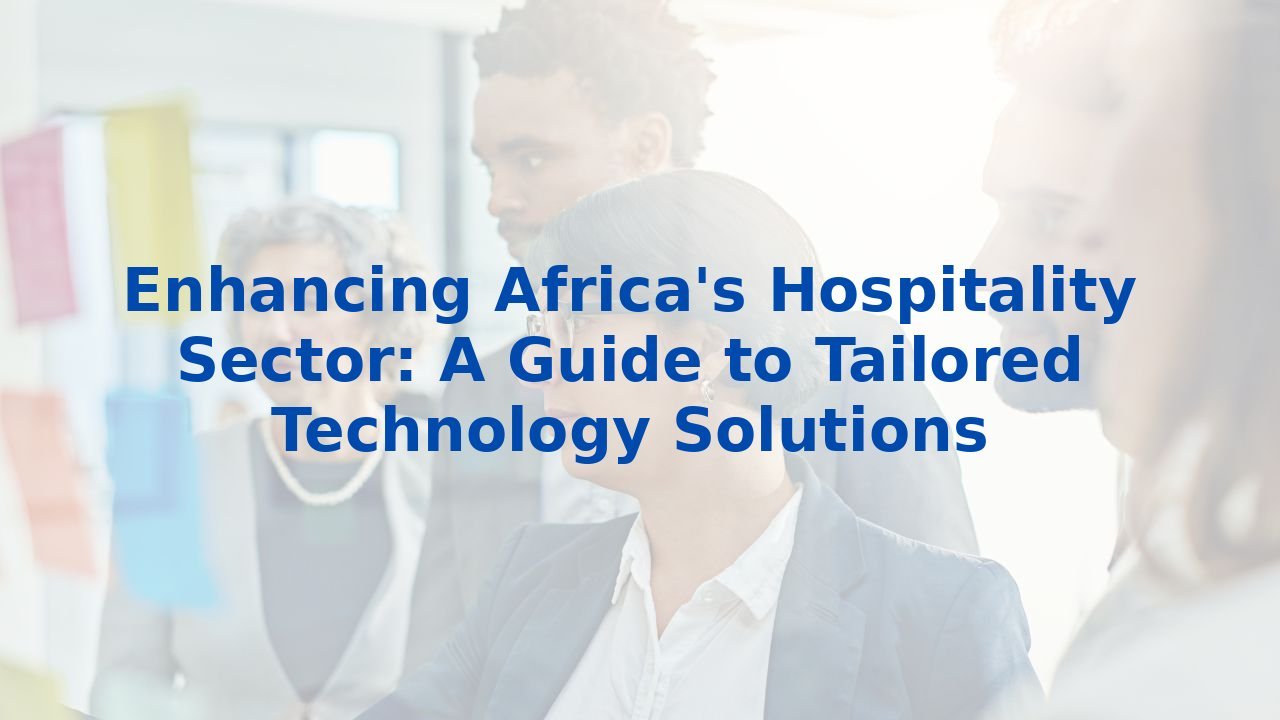Enhancing Africa's Hospitality Sector: A Guide to Tailored Technology Solutions
Enhancing Africa's Hospitality Sector: A Guide to Tailored Technology Solutions
As Africa's hospitality sector continues to bloom, there is an undeniable urgency for innovation to keep pace with evolving consumer expectations and market dynamics. Tailored technology solutions, particularly those powered by Artificial Intelligence (AI), promise not only to enhance services but also to revolutionize the operational frameworks that underpin these businesses. In this guide, we will explore how AI can drive efficiency in the hospitality industry and the profound impact this can have on creating memorable guest experiences.
1. Automating Routine Operations
One of the most immediate applications of AI in hospitality is the automation of routine tasks. Think about daily operations such as booking confirmations, inventory management, or scheduling staff shifts. Often, these tasks can consume hours of valuable managerial time and still leave room for human error. AI can streamline these processes, allowing staff members to redirect their focus from mundane activities to strategic initiatives that enhance guest experiences.
2. Optimizing Guest Management
Moreover, AI tools have the capability to analyze trends in guest behavior. By understanding patterns in booking preferences, guest reviews, and service requests, hospitality businesses can optimize their offerings to better meet guest expectations. Upgrading the guest management system with AI not only enhances operational efficiency but also provides insights necessary for tailored marketing strategies and personalized service delivery.
3. Leveraging Predictive Analytics for Demand Forecasting
Imagine having the ability to predict peak booking periods or anticipate when maintenance requests will surge. AI can make this a reality through predictive analytics. By analyzing historical data, hotels and resorts can forecast demand and adjust staffing, inventory, and service offerings accordingly. This level of preparedness minimizes operational disruptions and ensures that resources are allocated where they are most needed, enhancing overall service quality.
4. Enhancing Quality Control and Monitoring
In a sector where guest satisfaction is paramount, AI-supported monitoring and quality control systems can detect potential service issues before they impact the guest experience. By implementing real-time data analysis, hospitality organizations can identify irregularities in service delivery or guest feedback instantaneously. This proactive approach ensures consistent quality and reduces the risk of negative reviews, bolstering the brand's reputation.
5. Personalizing Customer Experiences
AI shines in its ability to analyze vast datasets to personalize guest services. By decoding guest preferences and past interactions, the technology can recommend customized experiences and services tailored to each individual. The more personalized the experience, the stronger the emotional connection to the brand, leading to loyalty and repeat visits.
6. Embracing AI for Enhanced Security and Risk Management
As hospitality businesses increase their reliance on technology, cybersecurity becomes an essential component of operations. AI can assist in detecting unusual patterns indicative of fraudulent behavior, thus protecting both guest data and company assets. Leveraging AI for risk management means that hospitality organizations can respond proactively to potential threats, ensuring a safer environment for both staff and guests.
7. The Path to Increased Profitability
Integrating AI into the hospitality sector not only leads to heightened efficiency and improved guest satisfaction but also translates into increased profitability. With reduced operational costs and enhanced productivity through automation and predictive analytics, organizations are poised for healthier margins. A technology-driven approach allows for more intelligent resource allocation, ultimately resulting in greater returns on investment.
8. Training Employees: The Cornerstone of AI Integration
To unlock the full potential of AI, investing in employee training is crucial. Training programs should prepare staff to work seamlessly alongside AI technologies—equipping them with knowledge about data interpretation, technology integration, and leveraging AI insights. The human touch remains essential, and training ensures that employees are not just passive users of technology, but active participants in a transformative process aimed at delighting guests.
Conclusion
As the hospitality sector in Africa accelerates towards modernization, harnessing the power of AI presents an incredible opportunity. From automating routine tasks to enhancing guest experiences through personalized services, AI's potential impact is profound. By focusing on tailored technology solutions and developing a skilled workforce through comprehensive training, hospitality businesses can seamlessly navigate the future. In an industry where experience is everything, positioning technology at the core of operations is not just advantageous—it's essential for thriving in a competitive landscape.
To explore further, consider embarking on a journey of discovery in AI training, where the right skills can empower your organization to harness the future of hospitality.



